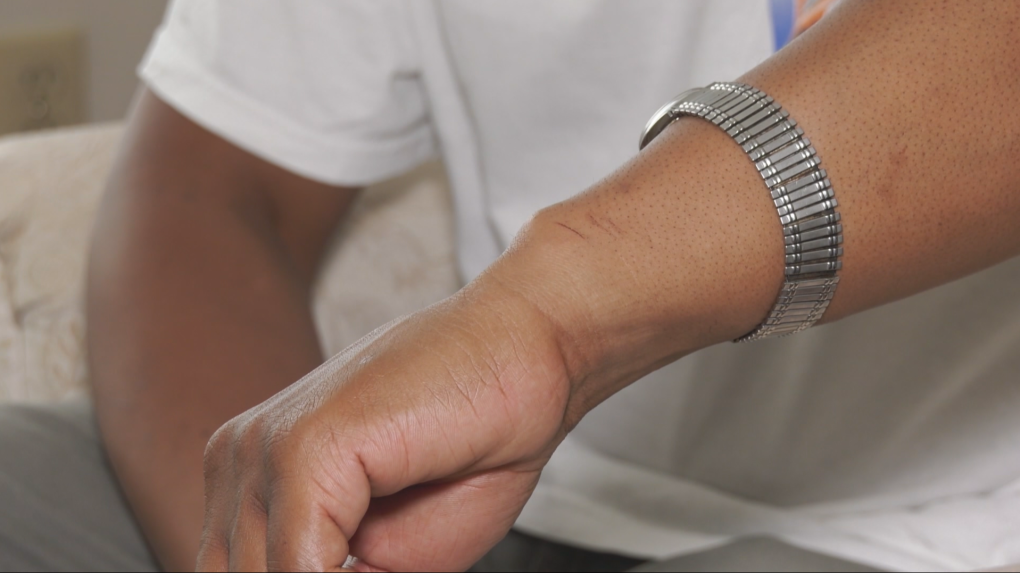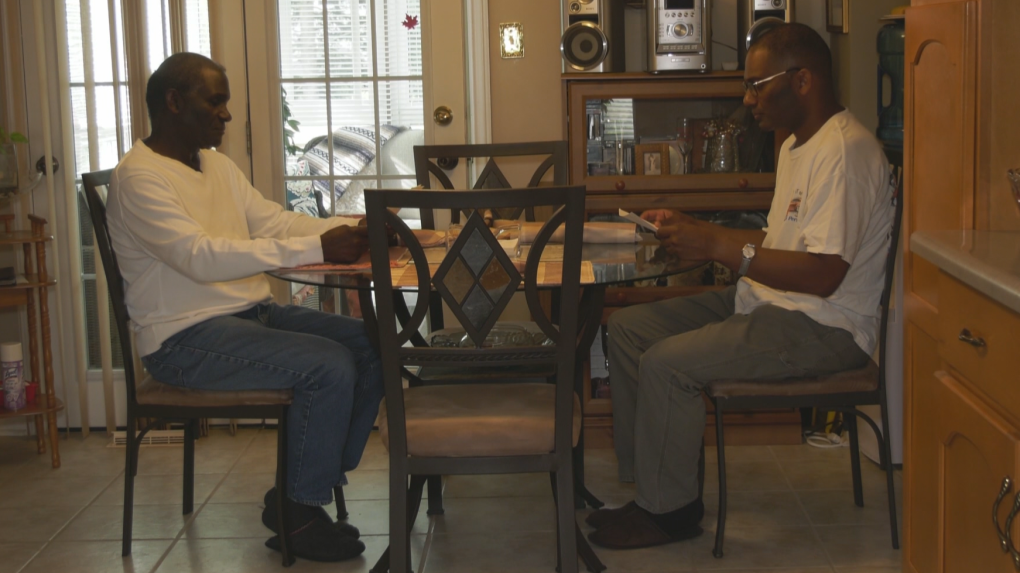Ontario father demands accountability after autistic son's arrest for assault
A Cambridge, Ont. father wants answers after his adult son, who has autism, was arrested and charged with assault after an encounter with a jogger.
On Sept. 18, at around 8:50 a.m., Soren Martin was walking on the sidewalk along Jamieson Parkway on his way to catch the bus that takes him to work.
“I was walking, walking too fast,” Soren recalled.
The 48-year-old then knocked a woman jogging on the sidewalk.
“I tripped her up,” he added.
According to Soren’s father Glaspa Martin, Soren later said he did not purposely run into the jogger. Glaspa confirmed Soren walks quickly and would have been focused on getting to work.
“It was an accident,” Glaspa told CTV News. “And Soren indicated that, over and over again: it was an accident.”
Soren got on his bus, but when it stopped at the Cambridge Centre transit terminal shortly after 9 a.m., he was arrested by officers with the Waterloo Regional Police Service.
“Police officers arrested me. Taken straight to the hospital, immediately,” Soren recalled.
Glaspa said he received a call from Waterloo Regional Police at 10:20 a.m. but did not pick up, thinking it was a scammer. Twenty minutes later, police called again, and this time he did answer.
“The person, she identified herself, and said… my son Soren was arrested for assault and he’s at the Cambridge Memorial Hospital.”
Glaspa went to the hospital where he ran into Soren’s job coach, who had also been called. He found Soren in handcuffs, which his father said left marks on his wrist. The job coach then told Glaspa that Soren had asked officers to loosen the handcuffs.
 Soren Martin shows his injury from wearing handcuffs during his arrest by Waterloo Regional Police. (Krista Simpson/CTV News)
Soren Martin shows his injury from wearing handcuffs during his arrest by Waterloo Regional Police. (Krista Simpson/CTV News)
Soren’s father also learned a blood test had been done on his son, and he wondered who had authorized that procedure. He believes Soren’s parents should have had a say.
“Based on the fact that he would not be able to articulate certain things, then of course, an adult or a parent should be called,” Glaspa explained.
He’s concerned assumptions were made about his son.
“My only reason for believing why he was taken to the hospital, which was not explained to me, [was] because Soren walks very brisk and, of course, is not able to articulate well,” Glaspa said. “I believe they thought Soren must be on drugs or he must have been intoxicated.”
Soren was charged with assault.
 Glaspa Martin sits with his son Soren Martin in Cambridge, Ont. (Krista Simpson/CTV News)
Glaspa Martin sits with his son Soren Martin in Cambridge, Ont. (Krista Simpson/CTV News)
Waterloo Regional Police did not provide an interview to CTV News, but sent a summary of the incident as reported to them, which reads, in part: “A female was running in the area of Jamieson Parkway and Franklin Boulevard when she attempted to move out of the path of a male who proceeded to body-check her, causing her to fall to the ground. The male tried to kick the female while she was on the ground before being startled by a passerby honking their horn. It was reported that the male laughed and ran away, boarding a Grand River Transit bus.”
Soren’s father told police at the hospital that Soren would not have intentionally knocked someone over, or tried to kick the woman.
“I said: ‘No, Soren would never do such a thing,’” Glaspa said. “Soren, of course, over the years has shown no sign of being violent at any point in time.”
The family has many other questions, including why handcuffs were used on Soren and who authorized a blood test.
The family has cited research from Britain’s National Autistic Society, which says using handcuffs should be avoided when police encounter individuals with autism.
Cherri Greeno, the director of corporate affairs for the Waterloo Regional Police Service, said officers are limited as to what can be said while the case remains before the courts. She did, however, provide a list of eight reasons for the use of restraining devices:
- To prevent the escape of a prisoner in custody
- When the prisoner has been arrested for an offence involving violence
- When the prisoner has displayed violent tendencies or is resistive towards any member
- When the prisoner is perceived to have capabilities superior to those of the member
- For the safety of the public or members involved
- To control a number of prisoners being transported
- To prevent loss or destruction of evidence on or about a prisoner where an immediate and effective search cannot be made
- To prevent a prisoner in detention from self-injury
Greeno said any medical procedures would have been done under the direction of medical professionals.
CTV News also reached out to Cambridge Memorial Hospital who declined to comment, citing patient privacy.
Greeno also added that officers are provided with a variety of training courses, including an Autism Spectrum Disorder course “which outlines some of the indicators that a first responder can recognize as indicative to an individual with autism, as well as some strategies and recommendations that may help first responders adapt or modify their approach to better support the individual in an emergency situation.”
Soren’s father does not believe more training is what’s needed, but rather, accountability.
He said he’s speaking publicly about what happened to his son so it doesn’t happen to others.
“I would like to create some kind of awareness about autistic people and, at times, the way they are treated,” Glaspa explained. “Society should know, and equally law enforcement, the vulnerability of these people.”
Soren has a court date at the end of October. His father would like to see the assault charge dropped – along with an apology.
CTVNews.ca Top Stories

opinion Tom Mulcair: Prime Minister Justin Trudeau's train wreck of a final act
In his latest column for CTVNews.ca, former NDP leader and political analyst Tom Mulcair puts a spotlight on the 'spectacular failure' of Prime Minister Justin Trudeau's final act on the political stage.
B.C. mayor gets calls from across Canada about 'crazy' plan to recruit doctors
A British Columbia community's "out-of-the-box" plan to ease its family doctor shortage by hiring physicians as city employees is sparking interest from across Canada, says Colwood Mayor Doug Kobayashi.
'There’s no support': Domestic abuse survivor shares difficulties leaving her relationship
An Edmonton woman who tried to flee an abusive relationship ended up back where she started in part due to a lack of shelter space.
opinion King Charles' Christmas: Who's in and who's out this year?
Christmas 2024 is set to be a Christmas like no other for the Royal Family, says royal commentator Afua Hagan. King Charles III has initiated the most important and significant transformation of royal Christmas celebrations in decades.
Baseball Hall of Famer Rickey Henderson dead at 65, reports say
Rickey Henderson, a Baseball Hall of Famer and Major League Baseball’s all-time stolen bases leader, is dead at 65, according to multiple reports.
Arizona third-grader saves choking friend
An Arizona third-grader is being recognized by his local fire department after saving a friend from choking.
Germans mourn the 5 killed and 200 injured in the apparent attack on a Christmas market
Germans on Saturday mourned the victims of an apparent attack in which authorities say a doctor drove into a busy outdoor Christmas market, killing five people, injuring 200 others and shaking the public’s sense of security at what would otherwise be a time of joy.
Blake Lively accuses 'It Ends With Us' director Justin Baldoni of harassment and smear campaign
Blake Lively has accused her 'It Ends With Us' director and co-star Justin Baldoni of sexual harassment on the set of the movie and a subsequent effort to “destroy' her reputation in a legal complaint.
Oysters distributed in B.C., Alberta, Ontario recalled for norovirus contamination
The Canadian Food Inspection Agency has issued a recall due to possible norovirus contamination of certain oysters distributed in British Columbia, Alberta and Ontario.


































